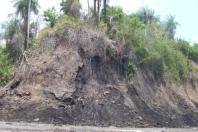VERNAL — An Estonia company that has turned oil shale into fuel oil during the past 30 years wants to mine rock from a remote region of the Uintah Basin, tapping 2.6 billion barrels of oil in the decades to come.
That staggering production, 50,000 barrels of oil per day, would represent one-third of Utah's liquid fuel consumption and is touted to emerge from a processing and refining plant that would put power back into the energy grid.
Enefit American Oil, the American subsidiary behind these numbers, is banking on new technology at one of its recently debuted plants in Estonia to take Utah's oil shale and turn it into big money for the company, Uintah County and the state of Utah.
Oil shale foes, however, say the company has a poor track record in Estonia, a country that borders Russia, and they point to environmental threats on land and in the air in Utah, and question the drain that the operations could place on the West's scarce water resources.
While Estonia company representatives don't deny the practices of the past, they say technology and environmental stewardship have evolved from when the country was under Soviet control and reflects the work of an independent country with membership in the European Union.
"The main difference between historic activities during the Soviet era and now as the member of EU can actually be concentrated to the following words: higher efficiency, larger reuse and recycling of byproducts and waste, better pollution control monitoring and reporting," said Tonis Meriste, the environmental development manager for Eesti Energia.
Rikki Hrenko, chief executive officer of Enefit American, said critics and the public would do well to remember one thing:
"Not all projects are created equal," she said. "This is what we do. This is all we do. "And we're very confident we can do this in an environmentally responsible manner."
But groups such as Western Resource Advocates worry about the use of water in Utah's arid climate and the emissions that would be produced by Enefit in a region already plagued by winter ozone problems.
"What are the potential impacts on existing business? What are the potential impacts on human health and the environment, on the ability of the state to ensure that water will be available?" questioned Western Resources' David Abelson, who is the organization's oil shale policy advisor. "All those have to be discussed and understood."
Some of those details of the project will be featured in a pair of meetings hosted by the Bureau of Land Management this week.
The project requires the installation of utility lines — such as pipelines for water, power and to convey the oil — and those lines cross BLM-owned land. An environmental impact study will have to be conducted and the BLM is seeking suggestions on specific issues that ought be part of the analysis.
Meetings are set for 6 to 8 p.m. Tuesday in Vernal at City Hall's community room and from 6 to 8 p.m. Wednesday in the level 4 conference room of the Salt Lake Main Library.
Hrenko and her team have already been meeting with advocacy groups like Abelson's and are anxious to describe details of the project, particularly why it is a good fit for Utah. Most importantly, she likes to explain what the project is not about.
"We don't frack," she said. "And we're different than oil sands or tar sands."
Energy in Utah
Fracking, or hydraulic fracturing, is the process of shooting a mixture of water, sand and other materials such as chemicals deep into layers of rock to create fractures. Those cracks then provide channels for gas or oil to move to a well for extraction.
http://www.deseretnews.com/article/865583090/Estonia-company-wants-to-pu...


